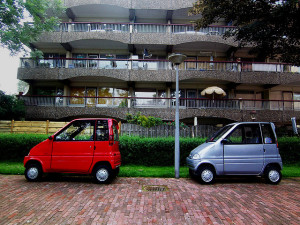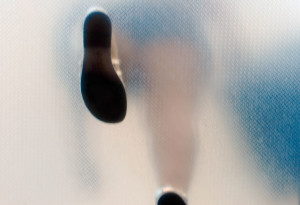
I have too many stories — I can’t take it anymore! — Cropped CC image “sad pumpkins” courtesy of Sharyn Morrow on Flickr. Some rights reserved.
I ran into a friend of mine from a class at my writer’s workshop this past week. We asked each other how the writing was going. I told him I seemed to be suffering from serial project monogamy. I hop from one prose piece to the next, sampling each one’s atmosphere, its personality, intelligence, and sense of humor. I’m on the lookout for The One. I will find it one day soon, and all my woes will evaporate. She will be like Harry Potter or Katniss Everdeen, and I will be set for the foreseeable future. In the meantime, I’m not quite sure this is The One…
I never quite finish a project; instead, I jump from beginning one to beginning another to beginning another.
I feel as though I’m avoiding something. I’ve had a lot of good ideas, I told my writing friend, but I hadn’t actually finished any writing (other than blog posts) in months.
He made a wry face when I mentioned my predicament, which leads me to believe that I’m not the only one who’s faced this situation.
Why do we serially start new stories that we don’t finish?
Why do we do this? A Google search under “writing problems beginning new projects never finishing” led me to over 366 million results. UNC Chapel Hill even has a webpage “handout” breaking down this “common writer’s ailment.” What drives us to pick up one new piece of writing after another, starting something new, instead of finishing what we’ve already begun?
If your answer is, “I’m procrastinating,” you’re right and you still haven’t gotten to the bottom of the matter.
I think our reasons for procrastinating boil own into two basic categories. One side is ruled by Fear. The other side is the Kid’s Mind, always wanting new toys.
Fear
We think the new writing is better than the old writing. Occasionally, we might be right about this one. However, we use this justification much more often than is strictly accurate. “New is better” smells like fear about the old being crap.
The piece can never be BAD if it’s not finished, right? We only judge the complete. The finished work. We don’t do judgments on drafts, because we know they’re just that: drafts. Works-in-progress. A possibility of what might become. Fear of failure or fear of success—whichever is true, these can only occur when the piece is finished, which we are trying at all costs to avoid.
Perfectionism. We fear our work is never good enough (and “editing” has a horribly amorphous quality to it; in theory, editing can go on forever).
We don’t want to deal with the work. New writing is easier because we know so little about the piece yet. We can dive in anytime and pick any spot in the story to address. Whether we’ve looked at any notes or not for the past three weeks doesn’t matter. By contrast, if I let the older stuff sit for a while and then want to work on it, I have to reacquaint myself with the material before progressing. Not only the facts — the who, what, where, and why — also the voice I was using at the time I put down the pen or tucked away my computer file. In effect, starting a new piece is our reward for being lazy!
Playtime!
Let’s face it, the new and shiny is always more interesting than the toy that we’ve had for a while. We know all the rough corners on that old toy, and what it will and won’t do. The new toy is filled with possibility. We haven’t exhausted our imaginations in play.
New projects are fresh. They have no history, and we don’t have any relationship baggage. We’re not carrying around pre-conceived notions, or memories of arguments past. Our interaction is uncomplicated. We are strangers saying hello at the train station, smiling at each other for the first time. Every aspect of the process is fun!
We are literary tourists. We have itchy, wandering feet, we are the proverbial rolling stone, and we like new vistas.
The illusion of productivity. Starting new writing makes us feel like we are doing something. Hey, I’ve started something new! Rather than plodding through the same old, well-visited terrain, we’ve begun a new itinerary, a new list. Leaving for a vacation is much more fun than coming home. On the way home, we are thinking about what we need to do when we arrive: open the windows, water the plants, unpack the suitcases. On the way out, we are leaving our responsibilities behind.
… and then what?
In the end, the reason underlying all reasons is our resistance to what happens next.
We don’t know what that is, and human beings generally dislike uncertainty. When we finish, then what? Does it suck? Do I have to send it somewhere now? Will it get published? Will anyone care?
Possibly not. So why do I do it? I look no further than my copy of Writing Down the Bones, by Natalie Goldberg. My piece may not have a Harry Potter or Katniss Everdeen, but, as Natalie says,
“If you are a writer, write.”
== == ==
Are you a serial project monogamist? What is the most wild way you have ever tried to break the cycle?





